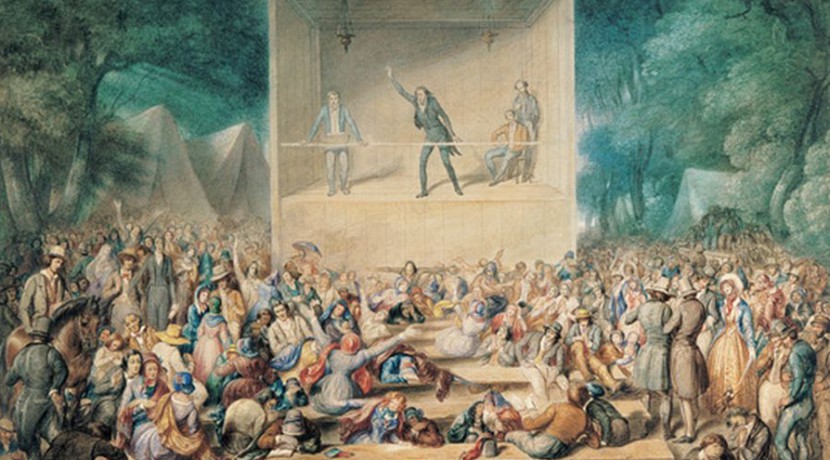Same Song, Different Era: America is Doomed. Thanks, Heathens
It’s a very common sentiment that America is on the precipice of losing her place as the preeminent superpower of the world because our moral compass has been misdirected by an ever-increasing secularism and the erosion of Christianity.
Most people who espouse this belief depict a continent founded by, and a nation freed by, Christian beliefs that has since become detached from its roots, resulting in what they perceive as the historically unprecedented moral decadence of today.
Is this belief true? Does it stand up to historical scrutiny?

An Methodist revival during the Second Great Awakening (Burbank, 1839)
Contrary to what so many believe, our country did not start out extremely religious, only to witness a slow steady decline in piousness. Historians note that our religious fervor has been cyclical through four Great Awakenings that have occurred approximately every fifty years and have each lasted about fifty years from peak to valley.
The Puritans fled England to escape religious persecution only to establish an enforced uniformity of faith in their new Massachusetts Bay Colony. Those who did not conform were banished, and if they returned they were subject to execution. That certainly doesn't sound very American to me. Rhode Island was founded by those fleeing persecution right here in North America, not from across the ocean.
The colonies were fractured based largely on their varying religious affiliations. The Colony of Virginia made Anglicanism the officially mandated state religion in 1632. Starting in 1624 Virginia used the church to collect taxes. That doesn't sound very American either, does it? Due to this forced religious conformity, the overwhelming majority of settlers on the frontier rejected all religion in our early years. And their lifestyles would have appalled most modern secular Americans in all aspects, from condoned rape to sanctioned fights over petty squabbles that involved eye gouging and the biting off of testicles.
The first Great Awakening occurred in the early eighteenth century when we moved away from state-run religion and brought religion into the home through the Book of Common Prayer. Church attendance rose to 80 percent by 1740. By 1780, however, in the heart of our revolution, this number had dwindled to an astoundingly low 10 percent. Out of this dearth of religious fervency sprang deism which reached its height of popularity in the late eighteenth century. It “accepted the existence of a creator on the basis of reason but rejected belief in a supernatural deity who interacts with humankind.” This 200-year-old form of faith is once again becoming prevalent today, although it lacks the deist label. It is also the form of religiosity that most profoundly influenced our founding fathers. So in that sense, the United States today shares many of the same religious sentiments as those held during the time our country was founded, more so than either immediately before or after.
Our religiosity played as much a role in dividing our country during the Revolution as it did in inspiring it. In fact, the aforementioned Book of Common Prayer included prayers for the English monarch, to give him victories over his enemies. In case you don't get who exactly the prayer is referring to as enemies, it was the patriots.
Another Great Awakening occurred in the early nineteenth century, leading to the rapid decline of deism. It largely rejected the ideals of the Enlightenment, moving toward Romanticism, and it attempted to rid society of its evils before the anticipated imminent second coming of Christ. One can see how unsuccessful it was by looking at events of our society between 1800 and 1840, from the systemic corruption of our politics, to the devastation inflicted on the Native Americans, to the rapid expansion of chattel slavery.
The Third Great Awakening started in the 1850s and lasted into the early twentieth century. This period of time covers the slaughter of 600,000 of our own people fighting over the right to own another human and stretched into our first inklings of imperial ambition.
The saddle between the Third and Fourth Great Awakenings, when religious fervor declined, saw relative peace through its first thirty years and carried us through our Great Depression. Our country also fought and helped win World War II, and we commonly recognize those Americans involved, who were statistically not as religious as the previous generation, as our “greatest generation.”
The Fourth Great Awakening occurred during the 1960s, believe it or not, and was a counter-revolutionary movement to Haight-Ashbury and the hippy peace and free love movement. The Nixon-penned "silent majority" was at the heart of what signified a steady decline in the mainline conservative religions and an explosion of the Evangelicals, the Southern Baptists, and the megachurch phenomenon. It also swept in our recent era of interventionism and militaristic romanticism.
We are starting to work our way out of that Fourth Awakening now, hence the reactionary backlash and the renewed calls for the imminent end of the world by the baby boomers who came of age at the heart of it.
But if history is any indication, this coming fifty-year ebb in religious zealotry won't necessarily spell the doom of America. It might actually initiate a revitalization of our country based on a renewed commitment to science, secular education, and reason. It will likely be a tumultuous transition, however.
This isn't meant to be anti-religious. It's just a counterpoint to a widely offered postulation. Although the religious right may believe that their sense of morality is necessary for progress, history seems to have proved otherwise.
